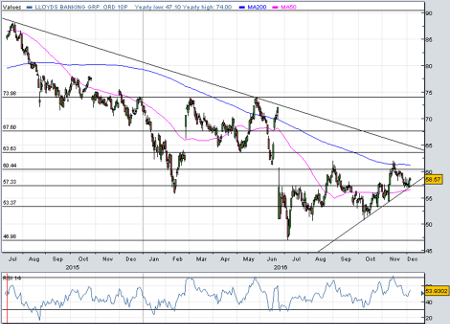Best bank share tip for 2017
8th December 2016 09:00
by Lee Wild from interactive investor
Share on
London's bank shares index is hardly changed in 2016, but the past 11 months have been anything but dull. After losing over a quarter of its value during the first six weeks of the year, the sector rallied more than 40% from its post-EU referendum low. Things could get even better for some, according to UBS, which has just named its top picks for 2017.
"The turnaround in sector performance reflects increased optimism about global growth, expectations of economic expansion together with prospects of higher interest rates, especially following in the US presidential election," explains UBS.
"Should the banking sector finish the year in positive territory, it will be the first time since 2013, when the sector ended up 13.5%."
In a hefty 95-page tome, the broker's team of analysts outline a number of positive developments for the industry, suggesting fundamentals are improving.
Expect a gradual recovery in loan growth, which UBS believes has bottomed out, and a benign environment for asset quality as capital is built up. The broker's expectations for return on equity (ROE) have improved 20 basis points in recent months, yet remain well below historical levels at a forecast 10.7% in 2017.
A 96-basis point jump in US 10-year bond yields since July to 2.32% is also good news for banks. Traders think president-elect Donald Trump's promised economic stimulus could underpin faster growth and herald the return of inflation, says UBS.
"Analysis of US 10-year bond yields and global banks' share price performance over the past 10 years shows a reasonably positive correlation, implying that rising US Treasury yields tend to be generally positive for global banks' share price performance."

American banks, already surging on expectations of a Wall Street-friendly Trump presidency, should do well if he goes for a lighter regulatory touch for the sector.
"Deregulation in the US but tighter financial regulation elsewhere would likely provide a major structural advantage for US banks internationally," says UBS, "creating opportunities for market share gains and, potentially, pricing power over the medium term."
Despite the positives, UBS thinks global banks are fairly priced at 9.8 times earnings estimates for 2017 and a price-to-book value of 0.9 times. "[We] would need to see evidence of stronger positive earnings momentum to become more constructive," it says.
Stand-out lenders
Eleven lenders stand out for the broker, although from the UK only makes the "most preferred" list, with a 'buy' rating and 67p price target. In fact, it's one of UBS's key recommendations across the European bank sector.
It's among the cheapest in terms of price/earnings (PE) multiples, too, trading on 8.1 times adjusted earnings per share, rising to 9.2 in 2017. A price-to-book ratio of 1 times and 0.9 times, respectively, is low, too, while forward dividend yield of 6.9% for next year is streets ahead of the other ten UBS top picks.
Lloyds should stay capital generative, delivering a 5% yield in 2016 and 7% in 2017"As the only large-cap UK lender with the capacity to re-price deposits enough to offset the impact on loan returns of a lower BoE rate, we expect a resilient net interest margin," says UBS analyst Jason Napier.
"Lloyds has also done the least to reset its branch network for the digital age over the last five years, leaving room for further cost-cutting if required.
"A lower-risk loan portfolio should keep impairments manageable. In all, we expect the franchise to remain strongly capital-generative, delivering a 5% yield in 2016 and 7% in 2017."
Uncertainty in spades
That's reassuring, considering there's uncertainty in spades, specifically around Brexit and Article 50. Another anticipated cut in interest rates by the Bank of England will also further pressure margins.
However, Napier predicts strong growth in stated profits in 2017 for the five major listed UK banks, driven by big reductions in "below-the-line" charges and non-core asset losses.
"Bank capital is, we think, at least adequate: , Lloyds, and all enter fourth-quarter 2016 with capital above management target ranges," he says.
"We expect core banking in the UK to remain strongly profitable in 2017 despite our expectations for a slower economy and lower interest rate environment."
On the downside, Standard Chartered makes the UBS list of predicted losers, with a 'neutral' rating and 620p price objective. Although Standard only trades on 0.6 times price-to-book, a PE of 18.8 for 2017 looks expensive and UBS expects only a very modest yield of 2.5% next year.
This article is for information and discussion purposes only and does not form a recommendation to invest or otherwise. The value of an investment may fall. The investments referred to in this article may not be suitable for all investors, and if in doubt, an investor should seek advice from a qualified investment adviser.